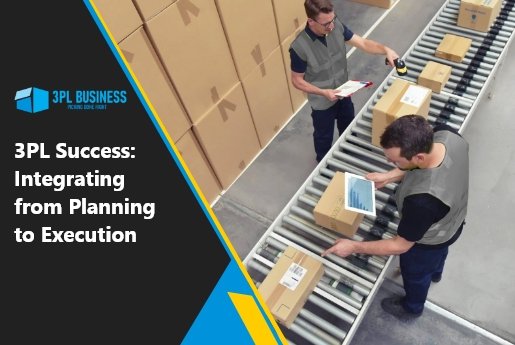From Planning to Execution: Key Integrations to 3PL Business Success
- February 15, 2024
- Posted by: admin
- Category: Newsletter

The efficiency of a supply chain process is not just a perk but a necessity for survival and growth. As brands strive to meet the ever-increasing customer demands, the complexity of managing fulfillment operations escalates. This is where the expertise of third-party logistics (3PL) companies becomes crucial. Third-party e-commerce fulfillment services have become the backbone of many successful online retail businesses. They offer a streamlined approach to logistics, encompassing everything from piece picking and kitting to comprehensive pick, pack, and ship warehouse operations. This post highlights the key integrations essential for an effective 3PL implementation, emphasizing how these integrations can enhance supply chain efficiency and improve cost savings.
If your expectations still need to be met or exceeded, we invite you to contact us immediately. Our team of experts is ready to collaborate closely with you, providing customized solutions designed to meet your specific needs and surpass your expectations.
What is 3PL Implementation?
3PL implementation involves outsourcing your e-commerce logistics and fulfillment processes to a specialized provider. These services range from storage and inventory management to piece picking, kitting, assembly, and the final steps of picking, packing, and shipping. The goal is to optimize these processes, making them more efficient and cost effective.
Key Integrations for Efficient 3PL
Following are a few crucial integrations for efficient 3PL
- ERP Integration: Integrating your 3PL operations with your Enterprise Resource Planning (ERP) system is essential. This ensures a seamless data flow between your business and the logistics provider. It results in more efficient operations, real-time updates on inventory and orders, improved financial tracking, and heightened order accuracy.
- E-commerce Platform Integration: For businesses in online retail, integrating e-commerce platforms with 3PL services is vital. This direct link means that the order information is automatically transmitted to the 3PL system for immediate processing. This leads to quicker order processing, fewer errors in data entry, and a smoother customer experience from the point of order to delivery.
- Transportation Management Systems (TMS) Integration: Effective transportation management is vital, and integrating TMS can optimize shipping operations, including carrier selection and route planning. This integration can lead to significant cost savings, improved delivery times, and better visibility into shipping operations.
- Supply Chain Visibility Tools Integration: Real-time data on product locations and status is essential for modern supply chains. This results in enhanced tracking capabilities, better risk management, and more informed decision making.
- Inventory Management Systems Integration: Keeping track of inventory levels and movements is critical, and integrating these systems with your 3PL can streamline this process. It helps prevent stockouts or excess stock, improves order accuracy, and enables better demand forecasting.
- CRM Systems Integration: Aligning logistics operations with customer relationship management is crucial as this updates CRM professionals regarding customer preferences, package tracking, feedbacks, and so on. This leads to improved customer satisfaction, personalized service, and enhanced customer loyalty.
- Business Intelligence (BI) Tools Integration: Utilizing data analytics for strategic decision making is increasingly gaining importance owing to huge amounts of data being gathered, transferred, and analyzed. This data is used in strategic planning and making informed decisions. Integration of BI tools offers data-driven insights for optimizing supply chain operations and predictive analytics for future trends.
- Compliance and Regulatory Systems Integration: Businesses in regulated industries must ensure that logistics operations comply with relevant laws. Systems are updated as per changes in laws and regulation which helps prevent of non-compliance, ensures enhanced safety, and streamlines audit processes.
- Customs and Cross-Border Integration: For international trade, efficient and compliant logistics are critical. It is necessary for systems to be updated with international laws, which is facilitated by integrated systems. This smoothens customs processes, reduces delays, and ensures adherence to trade regulations.
- IoT Devices and Sensors Integration: Integrating IoT devices can provide real-time data on goods in transit. This enhances live tracking, and improves product condition monitoring and predictive maintenance.
Third-party e-commerce fulfillment services have become the backbone of many successful online retail businesses. They offer a streamlined approach to logistics, encompassing everything from piece picking and kitting to comprehensive pick, pack, and ship warehouse operations.
Enhancing Supply Chain Efficiency with 3PL
The primary allure of 3PL services lies in their ability to enhance supply chain efficiency significantly. By outsourcing logistics operations to 3PL providers, brands can leverage the latest technology and expertise these companies bring. This integration leads to more effective inventory management, faster order processing, and improved delivery times – all critical elements in today’s fast-paced market.
Moreover, 3PL providers invest heavily in technology and infrastructure, which translates into better tracking, forecasting, and management of logistics operations. As a result, businesses can enjoy enhanced visibility and control over their supply chains, leading to informed decision-making and streamlined processes.
Cost Savings Through Third-Party Logistics Fulfillment
One of the most significant benefits of partnering with a 3PL provider is the potential for substantial cost savings. Third-party logistics fulfillment companies offer economies of scale that most individual businesses need help to achieve. These savings come in various forms – from reduced shipping and storage costs to more competitive freight rates.
By outsourcing to a 3PL provider, businesses can avoid the hefty capital investments required for warehouse space, technology, and staffing. This aspect is particularly beneficial for small- and medium-sized enterprises that may not afford the investment and resources required for such an infrastructure. Furthermore, 3PLs often have established relationships with carriers and can negotiate shipping rates, which can be passed on to their clients.
Expanding Geographic Reach for Faster Shipping
In the realm of e-commerce, delivery speed is a crucial aspect that offers businesses a competitive edge. Partnering with a 3PL company with a widespread network of fulfillment centers can drastically reduce shipping times. By storing products closer to the end consumer, businesses can minimize shipping zones, reduce transit times, and enhance customer satisfaction. This strategic inventory placement is essential for companies looking to expand their reach nationally and internationally.

Conclusion: Finding the Right 3PL Partner
By understanding these challenges and implementing solutions provided by custom fulfillment service providers, businesses can enhance their operational agility, reduce costs, and improve customer satisfaction. Partnering with experienced providers like 3PL Business can transform your business, enabling it to thrive even in challenging times.
Contact 3PL Business
To explore how 3PL Business can transform your business through integration, contact our team at (732) 983-4801 or email sales@3plbusiness.com. Their team offers tailored solutions to address your specific needs, ensuring that your logistics operations are a necessary part of your business and a driving force behind its success.

